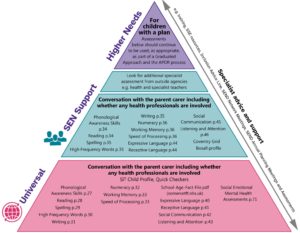Overview
The pyramid below provides the Graduated Response to assessments.
This guides what settings would be expected to be completed as part of a clear graduated response to assess the need to inform the APDR process.
Links to these tools can be found within the ‘Tools for Identification of Need’ sections within the Broad Areas of Need section broken down into
- Cognition and Learning
- Communication and Interaction
- Sensory and Physical
- Social, Emotional and Mental Health (SEMH)
‘Where a pupil continues to make less than expected progress, despite evidence-based support and interventions that are matched to the pupil’s area of need, the school should consider involving specialists’ – Code of Practice 6.58.
To access specialist support, Somerset Early Help Assessment (EHA) is the tool for practitioners to identify the needs of the children/young people and their families and make ‘request for services’ involvement where required if services already involved are not able to meet the identified needs.
Higher needs
Assessments below should continue to be used, as appropriate as part of a Graduated Approach and the APDR process.
SEN Support
Look for additional specialist assessments from outside agencies – for example, health and specialist teachers
Conversation with the parent carer including whether any health professionals are involved.
- Phonological Awareness Skills
- Reading
- Spelling
- Writing
- Numeracy
- Working Memory
- Speed of Processing
- Expressive Language
- Social Communication
- Listening and Attention
- Coventry Grid
- High Frequency Words
- Receptive Language
- Boxall profile
Universal
Conversation with the parent carer including whether any health professionals are involved.
SIT Child Profile, Quick Checkers
- Phonological Awareness Skills
- Reading
- Spelling
- High Frequency Words
- Writing
- Numeracy
- Working Memory
- Speed of Processing
- Expressive Language
- Receptive Language
- Social Communication
- Listening and Attention
- Social Emotional Mental Health Assessments
All these areas incorporate specialist advice and support. For example:
- training
- Support Services for Education resources
- inclusion advice line
- SEND network meetings
- SEND annual planning meetings and assessments


